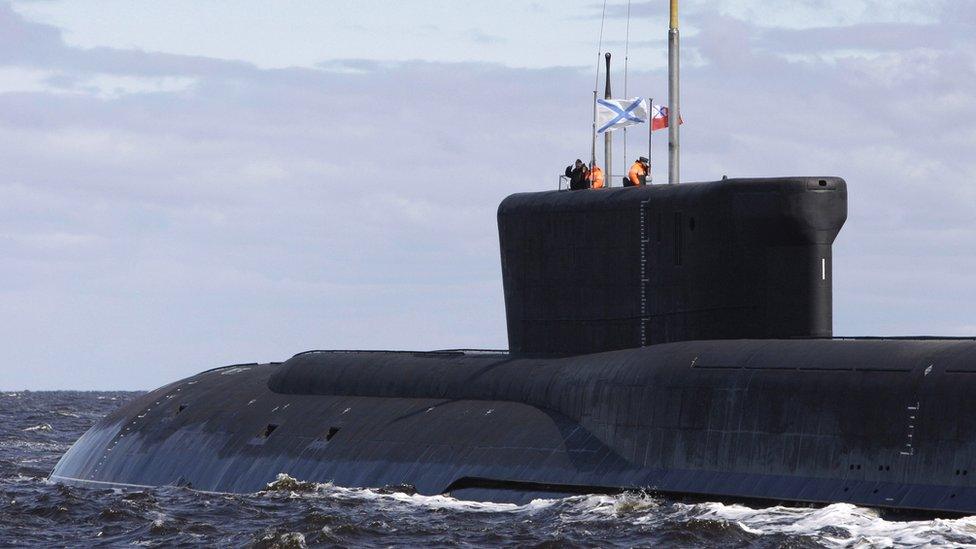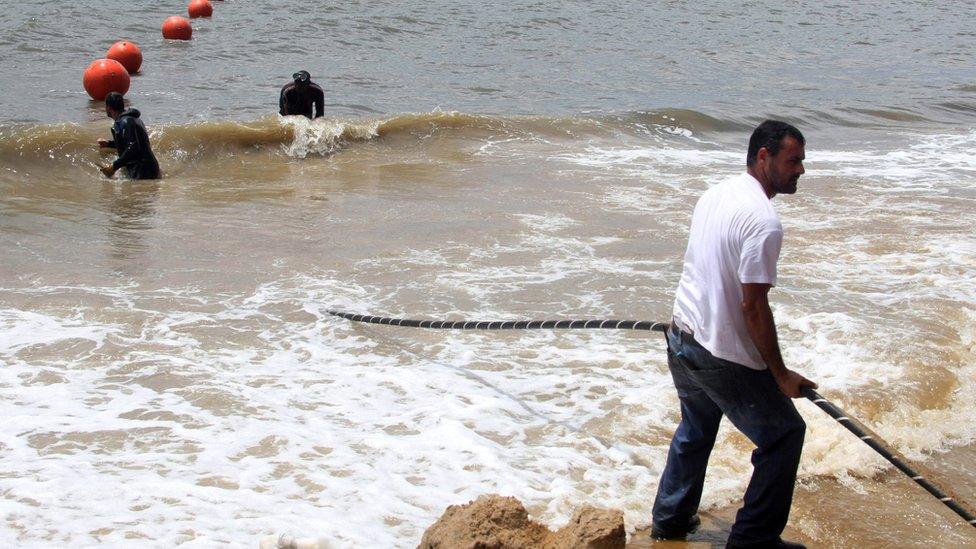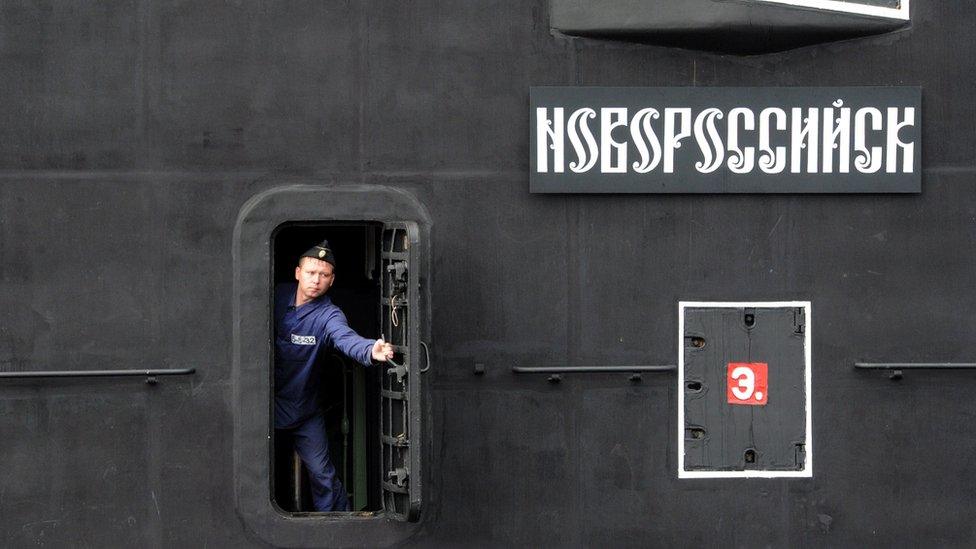Could Russian submarines cut off the internet?
- Published

The Russian military might be investigating ways of disrupting subsea cables
Russia could be developing plans to sever key internet communications during future wars, according to a report in the New York Times, external.
The article reports that various military sources are concerned about a spike in Russian naval activity near the locations of undersea cables.
Such cables are vital to the internet's daily running and constantly ferry huge amounts of data between continents.
There are many thousands of miles of them,, external snaking under the world's oceans.
But could Russian submarines really be investigating ways of cutting these crucial cords?
Russia watchers have long been aware of the threat, says Keir Giles, associate fellow of the Russia and Eurasia Programme at think tank Chatham House.
However, he added that cutting the US off from the web would probably be impossible because of the number of connections going in and out of the country.
"I very much doubt that anyone would think of cutting off the US," he comments. "It is only going to work in locations where the internet geography is going to create a vulnerability in communications."
But, Mr Giles adds that there are parts of the world where such action might be considered viable.
Crimea connection
Ukrainian telecoms providers reported disruptions to a key internet exchange point and cable connections during Russian military activity in the Crimean peninsula in 2014.
The incident is mentioned in a Chatham House report on Russian information war tactics which is being published later this year.
"They can interfere with internet infrastructure in order to gain [complete] control of [the information available in] specific regions," says Mr Giles, who adds that while much information about current naval activity in this vein is highly classified, the tactic does seem plausible.
"It does make sense given the intense programme of submarine building, including some very specialised vessels," he says. "It wouldn't be surprising that they would want to do this."

More and more cables are being laid as worldwide demand for internet access grows
Some states are known to have developed capabilities to tap cables in undersea locations, and the US is reported to have done this in the 1970s.
What's more, documents leaked by NSA whistleblower Edward Snowden allege that intelligence agencies like GCHQ and the NSA can intercept data communications at listening sites such as Bude, external in Cornwall, where a major transatlantic cable comes ashore in the UK.
Severing cables entirely, however, would be a somewhat different tactic.
The internet was designed to be a "resilient" network - one which does not rely on the operation of all connection points to remain functional.
This means that while shutting down certain links or connections might be disruptive to some, there are often ways in which traffic can be routed through other cables and still reach the intended destination.
That said, there are plenty of points at which the internet would be more vulnerable to an act of cable severing than others.
Fibre optic cables traversing entire oceans, for example, carry disproportionately large swathes of the world's internet traffic. Some of the heightened Russian naval activity is said to have been detected in these deep sea locations.
Anchor trouble
Accidents in which fishing equipment, anchors or even earthquakes cause disruptions to cabling are relatively frequent occurrences.
Most are quickly repaired without internet users ever being aware of a problem.
In 2008, a series of cable disruptions were detected in the Middle East which were subsequently attributed to clumsily dropped anchors in the Mediterranean and seas off the United Arab Emirates and Oman.
A few years later however, in 2013, Egypt arrested three divers who were found cutting through a major internet cable servicing parts of Europe, Africa, the Middle East and Asia.

Russia has been building many new warships and submarines
Some kind of cable-cutting equipment, perhaps attached to a submarine, could in theory work, according to Jeremy Hartley, owner of subsea cabling consultancy ETA.
He adds, though, that nearer to shore, cables are often buried and protected by extra layers of casing.
"The protection they have is they're generally buried to about a metre and that's intended to protect them against anchors and fishing which would of course make it not straightforward to damage by a submarine but not impossible either," he says.
Cable care
Burying the cables further off shore at deeper depths to protect them from cutting attacks would be possible, he adds, but it would also be expensive.
Mr Hartley did comment that the threat of terrorist or military action against such infrastructure was "certainly considered" by network providers, but that most protections would likely be done via routing traffic through other means.
"At the moment my perception has always been that military or terrorist action is a lower level threat - it's more likely cables would be damaged by anchoring," he comments. "So, that's how the protections are designed."
The physical presence of military personnel or assets at places where cables are vulnerable might be considered as a suitable protection during times of conflict, suggests Mr Giles.
But whatever measures are developed, it's clear that the internet is worth safeguarding.
"Internet infrastructure needs the same kind of protection at times of crises as other strategically important infrastructure," Mr Giles added.
- Published27 March 2013
